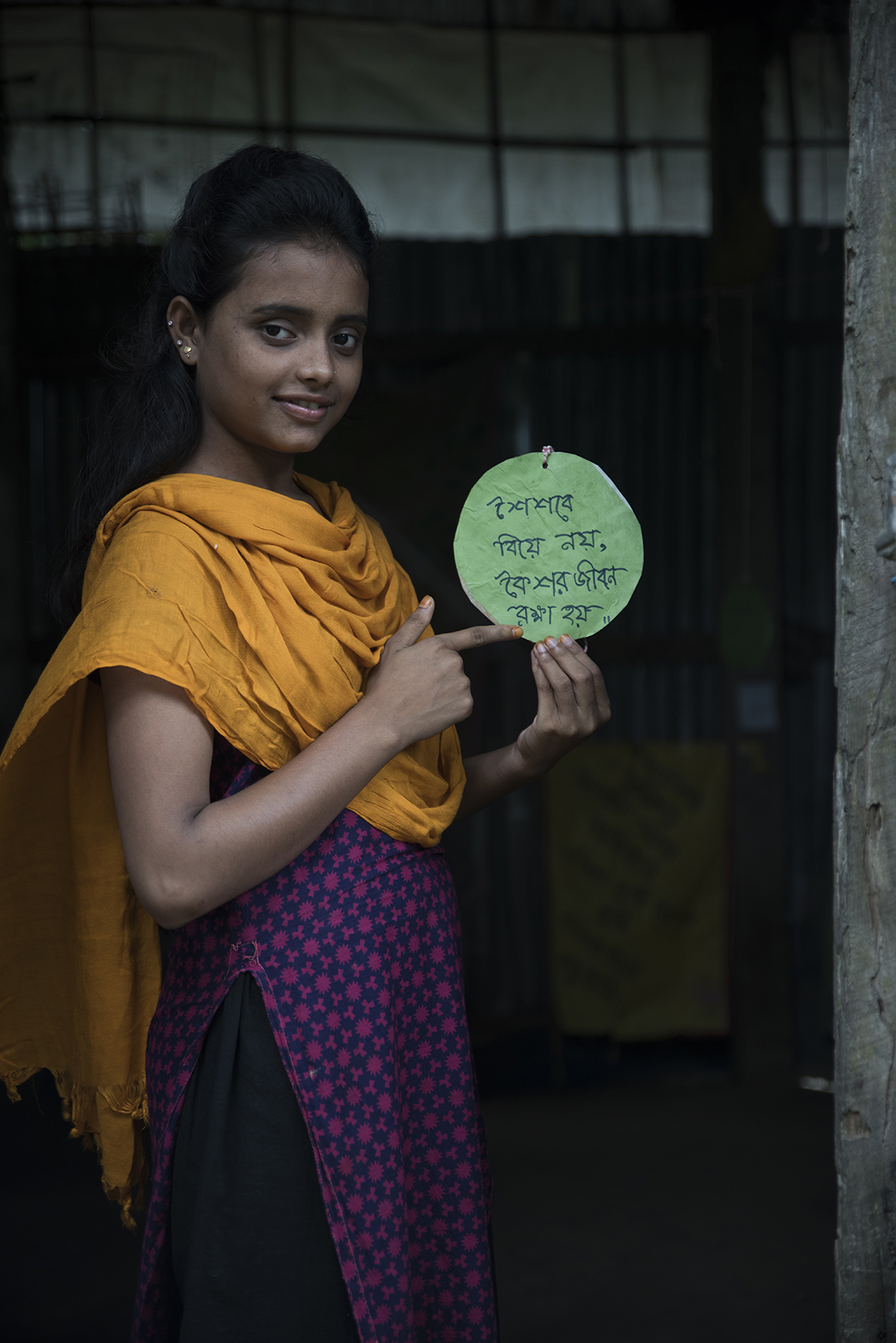
The name “Shammu” is an icon in the project Tipping Point. With three other siblings, Maksuda Jannat Shammu lives in Jamalganj union of Sunamganj District in the northeastern Bangladesh. She cannot recollect any memory with her father as he passed away when she was 7 years old. Love, care, strict rules – everything came from her mother. Since her husband’s demise, Shammu’s mother has been the sole breadwinner for their family of six, which was never easy. Despite all hardships, Shammu’s mother continued to support the entire family and managed to send everyone to school.
Shammu she was only a fifth grader when became an enlisted adolescent of Tipping Point project. Her relatives raised a lot of objections to her for just being involved with the project. Despite objections from other family members and neighbors, Shammu’s mother and grandmother encouraged her to be a member of the project. Consequently, there was a negative social hostility about her going out, playing outside and other relevant activities. Eve-teasing, criticism, name calling, complaints were just a few. Initially, the objections came from neighbors, but when her brothers and grandmother also started siding with the neighbors, Shammu started growing distant with them; despite so, she did not discontinue her ties with the project. Her only support, was her mother.
In the year 2017, Shammu passed the exam of 7th grade, but she could not get admission for the next year. Shammu’s mother fell sick from working too hard. Shammu was dropped out of school to attend her mother’s needs. To bear her mother’s medical expenses and family expenses, Shammu’s college going brother started working as a carpenter. After being treated for a few months, Shammu brought her mother back home. But she was no longer able to work as hard as before; so the load of the family expenses went to the older brother. Days became even harder. Six months of the year had already passed, and Shammu still wasn’t able to go back to school. But she never gave up as she continued to study at home, However, the time for enrolling for board exam was also knocking at the door. Seeing no other options left, Shammu shared her situation with the project staff.
The project staff discussed the problem with Ending Violence Against Women (EVAW) Forum and through their support, after almost 8 months of the academic year, Shammu got a chance to continue her studies for 8th grade. Since then, Shammu became even more dedicated and sincere towards her studies and the project activities. With her mother’s encouragement, she continued to be an active member for all of project activities (boat competitions, football, and cricket) at district, sub-district and national level without compromising on her studies.
Because of her activities and project involvement, Shammu and her mother had to face immense pressure from the neighborhood including insulting remarks and other unpleasant situations. But, they couldn’t be stopped. In February 2019, the project organized a Combined Cricket Match for adolescents. Over 70% of the villagers openly objected to this arrangement and group of 4-5 people were mobilized to visit all the households and discourage this event; the remaining 30% of the villagers agreed in silence. In this situation, only Shammu’s mother openly expressed her opinion in favor of the event and encouraged boys and girls to take part in this game. Despite all obstacles, the event was organized. However, the aftermath was disturbing. The boys and girls who took part in the event were shunned by the local mosques from participating in Arabic studies; Shammu’s younger sister was one of them. Most parents requested the mosques and the religious teachers to take their children back; but Shammu’s mother said, “If the teachers won’t take her back, no problem. I will give her the teachings she needs, from the knowledge I have.”
In the beginning, such negative attitude from the neighbors used to hurt Shammu’s feelings, but now this has become norm for her. In this early age, Shammu has realized that her mother is her sole supporter to fulfil her life’s dreams. People will always create obstacles but she has to pave her own way through this. Although few people silently supports her now, but she hopes for a day when the will also actively support her and stand next to her to become a part of her struggling journey.
About the project: The multi-country Tipping Point project addresses child marriage through a dynamic process of innovation, insight, and influence through advocacy in Nepal and Bangladesh. The project focuses on identifying the root causes of child marriage and facilitates innovative strategies to create alternative paths for adolescent girls. Grounded by this work, the project also seeks to influence the way policymakers, donors, researchers, and civil society approach the issue of child marriage, specifically to steer the global discourse beyond short-term solutions. The project works with adolescent girls and boys, parents, community and religious leaders, and nationally with networks of social activists, experts, and government agencies. These areas are both geographically and economically isolated from other regions. CARE expects this learning and innovation initiative to contribute to global understanding of the complex issues driving child marriage and strategies that can contribute to a “Tipping Point” of sustainable change to prevent child marriage and create viable alternative paths for adolescent girls. Funded by The Kendeda Fund, in Bangladesh, participants of this project are 28,000 girls and women, and 11,500 men and boys in Sunamganj and Rangpur districts.